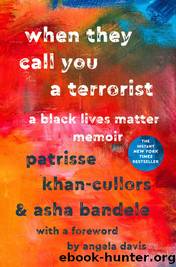When They Call You a Terrorist: A Black Lives Matter Memoir by Khan-Cullors Patrisse & Bandele Asha

Author:Khan-Cullors, Patrisse & Bandele, Asha [Khan-Cullors, Patrisse & Bandele, Asha]
Language: eng
Format: epub
Tags: Social Movements, feminism, Social Justice, Politics, Memoir, Race, United States, Autobiography, Biography, Non-Fiction
ISBN: 9781250171092
Goodreads: 37535147
Publisher: St. Martin's Press
Published: 2018-01-16T08:00:00+00:00
9
NO ORDINARY LOVE
Love takes off the masks we fear we cannot live without and know we cannot live within.
JAMES A. BALDWIN
Itâs Spike Lee who brings Mark Anthony and I together.
Iâm a year ahead of him, a senior in high school and I am obsessed with the Spike Lee Joint Bamboozled, a razor-sharp satire that tells the story of a Black man, Pierre Delacroix (whose real name is Peerless Dothan). Heâs a Harvard grad who is continually humiliated and abused by his white boss at a television network. The white boss, who is married to a Black woman, asserts that heâs Blacker than Delacroix and repeatedly, he calls him, Delacroix, Nigga.
The white boss refuses to allow any of Delacroixâs positive story ideas about Black people to go through, opting only for shows that depict us as vulgar caricatures. Delacroix, desperate to get out of his job, tries to get fired by creating a disgusting, racist minstrel showâblackface and allâbut it backfires. The network and white boss love it and the show becomes a success. Eventually, Delacroix embraces the success of the show, spins it as just satire and gets behind it. But by the end, and as a result of the extraordinary pain that arises because of the racist horrific, many of the characters in the film are killed, and there is a strong message about how the media has taught us to hate ourselves and how that hate leads to our death.
Those of us who repeatedly watch Bamboozledâkids in my senior classâare deeply impacted by it and its messages. We have conversation after conversation about how racism makes us hate ourselves and misdirects our anger toward one another rather than focusing it on where the sources of the problem lie. We talk about how dangerous media and pop culture can be, how complicit they are in shaping how we move in the world.
I want other students beyond our class to join the conversation, and because during junior year at Cleveland students study the âismsââracism, sexism, homophobia and classismâI think the film is a perfect vehicle for the junior class. Teachers make a classroom and equipment available to me, and I make flyers and the word gets out about the event. The classroom fills up. Of the roughly 200 students who are part of the arts and humanities program I am in at Cleveland, about 10 percent are Black, and, along with one or two people who are Latinx, one of whom is white, I think all of them show up. Mark Anthony is among them.
We have a talkback when the film ends, but the room is mostly silent. We are too young, we take ourselves too seriously to appreciate the satire. We can only absorb the pain. Most slowly file out but not Mark Anthony. Heâs in a chair in the corner. We havenât really talked before this. But his head is in his arms. He is not okay. I go over to him, sit atop the desk beside him, and start speaking gently.
Download
This site does not store any files on its server. We only index and link to content provided by other sites. Please contact the content providers to delete copyright contents if any and email us, we'll remove relevant links or contents immediately.
| General | Discrimination & Racism |
Nudge - Improving Decisions about Health, Wealth, and Happiness by Thaler Sunstein(7694)
The Fire Next Time by James Baldwin(5432)
iGen by Jean M. Twenge(5409)
Adulting by Kelly Williams Brown(4566)
The Sports Rules Book by Human Kinetics(4379)
The Hacking of the American Mind by Robert H. Lustig(4375)
The Ethical Slut by Janet W. Hardy(4243)
Captivate by Vanessa Van Edwards(3838)
Mummy Knew by Lisa James(3686)
In a Sunburned Country by Bill Bryson(3537)
The Worm at the Core by Sheldon Solomon(3486)
Ants Among Elephants by Sujatha Gidla(3463)
The 48 laws of power by Robert Greene & Joost Elffers(3254)
Suicide: A Study in Sociology by Emile Durkheim(3019)
The Slow Fix: Solve Problems, Work Smarter, and Live Better In a World Addicted to Speed by Carl Honore(3007)
The Tipping Point by Malcolm Gladwell(2914)
Humans of New York by Brandon Stanton(2868)
Handbook of Forensic Sociology and Psychology by Stephen J. Morewitz & Mark L. Goldstein(2704)
The Happy Hooker by Xaviera Hollander(2686)
